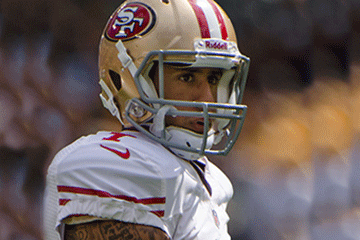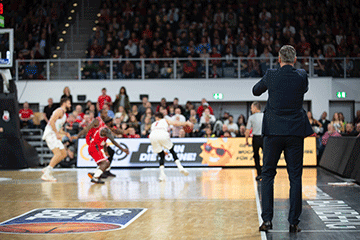
02/13/2020
You don’t need to be a university scholar to have heard the argument that black athletes are exploited by sports in America.
From former San Francisco 49ers quarterback Colin Kaepernick’s release from the NFL after kneeling during the National Anthem to support the Black Lives Matter movement to professional basketball star Lebron James’ public claim that there’s a double standard for black and white professional athletes, the issue often headlines the news.
“This affects all athletes,” said Kristine Newhall, a SUNY Cortland kinesiology assistant professor who researches race, gender and sexuality in modern athletics and fitness culture. “All athletes are giving up something to do their sport.”
On Thursday, Feb. 20, Newhall, who teaches classes that analyze ethical methods in research and sport, wants students and other campus community members to join her panel discussion called “Beyond Kaepernick: Exploitation of the Black Athlete.”
Sponsored by SUNY Cortland’s Kinesiology Department and the Institutional Equity and Diversity Office, the presentation will take place at noon in Brockway Hall Jacobus Lounge.
The discussion, which continues the university’s February celebration of Black History Month, is free and open to the public.
The panel presentation will include Newhall; Erin Morris, a SUNY Cortland assistant professor of sport management, and invited SUNY Cortland students. James Felton, SUNY Cortland’s chief diversity officer, will moderate the event.

The presentation builds on an original talk by Newhall around when the public first heard about Colin Kaepernick’s decision to kneel in protest during the National Anthem portion of NFL football games followed by his dismissal from the NFL. Newhall gave the talk with Felton, called “Something to Chew On.”
Having provided students with a platform to make their voices heard, Newhall will use the panel presentation to expand upon her previous topic and formulate a constructive conversation with the audience.
Newhall plans to give background on significant moments in history while providing a level of expertise.
“This is not a new issue,” said Newhall. She will discuss, for example, the 1968 Olympics in Mexico City.
“Not just that moment but what preceded that moment, there was discussion on whether or not black American athletes should even go to the Olympics,” she said.
Morris teaches a class related to intercollegiate and scholastic sport at SUNY Cortland, and will examine problems black athletes face throughout different levels of athletics.
“Exploitation is not something that only happens at the higher levels,” Newhall said.
"I am interested in using this panel to explore a wider definition of exploitation," she said. "In other words, what are the ways — beyond just salary and-or the debate over paying athletes — that black athletes in particular are exploited. What are the other consequences: to health, to emotional well-being, to the 'college experience,' to future leadership and job opportunities, to family life?"
For more information about the presentation, contact organizer Newhall.
Black History Month events, organized by the Africana Studies Department, continue later on Feb. 20 with “The Deficit Myth: Modern Monetary Theory and Creating an Economy for the People.” The lecture with economist Stephanie Kelton of Stony Brook University begins at 5 p.m. Contact Cultural and Intellectual Climate Committee series organizer Benjamin Wilson for more information.
Prepared by communications office writing intern Dean Zulkofske.
The Colin Kaepernick image above left is courtesy of Mike Morbeck/Wikipedia Commons.